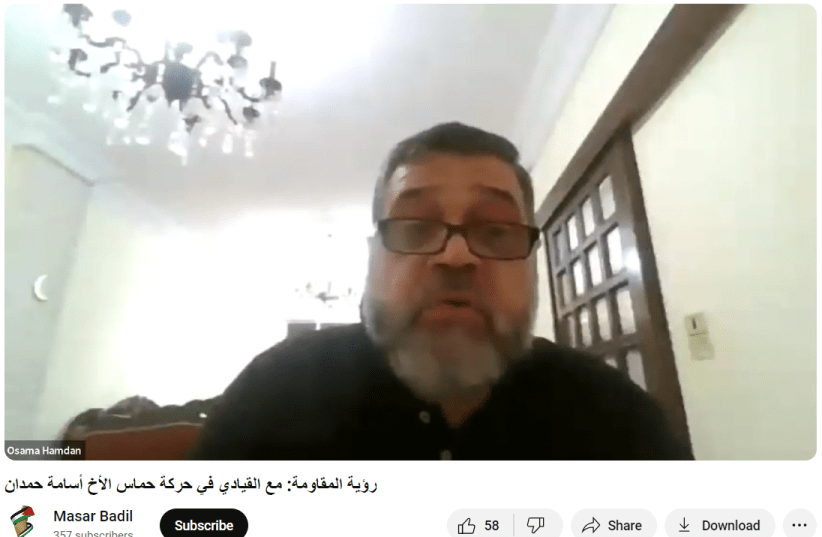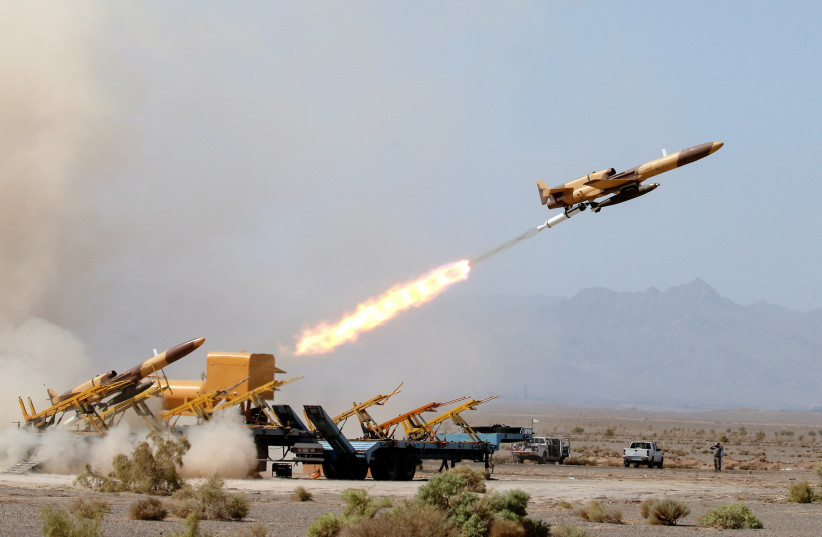Hamas leader Osama Hamdan spoke yesterday at a webinar hosted by Masar Badil, a group with ties to the PFLP, designated as a terror group by the EU, Canada, the US, Israel and others.
Hamdan referred to the issue of proposed talks about a ceasefire, adding: "we may be turning towards a direction of ceasefire, but this doesn't mean that the confrontation will stop… But I believe that the confrontation will be wider.” In this context, Hamdan enthusiastically claimed that Hamas is “facing an opportunity for a wide confrontation, which would challenge all the aid to Israel and will focus on the resistance of the Palestinian people,” calling to “develop methods of communication between actors in the resistance and strengthen the mechanisms of its activity.”
The Hamas official also lauded the mortar barrage which targeted the Kerem Shalom crossing yesterday, and in which four Israeli soldiers were killed. He added that it was aimed at the command headquarters of the Israeli activity in the area, also claiming that the barrage came to convey the message that Hamas keeps an open eye on the IDF’s preparations near Rafah, and that Israel will face more than it expects should it enter the southern city.
On the international level, Hamdan praised Russia and China for their support for Hamas in the UNSC against the “criminalization of the resistance.” He added that he believes that there is an “understanding on the Russian and Chinese side that the power of this axis of resistance is in favor of the international role of Russia and China,” adding that their role was beneficial for Hamas and they wish to see more.
Additionally, Hamdan commended the Iranian drone and missile attack against Israel, claiming that the attack proved the unity of the axis of resistance.
Hamdan also referred to the personal and organizational friction between the Hamas leadership in Gaza and abroad, deeming the opinions of Yahya Al-Sinwar and the leadership in Gaza as “important and taken into account in the decision making circles.” In this context, he accused that Israeli claims of Sinwar as sole decision maker on the ground are part of a propaganda campaign launched by Israel, adding that the terror organization’s negotiators work based on shared decision making mechanisms and principles.
‘West Bank is next’
As for the situation in the West Bank, Hamdan pledged: “I believe that the next stage will be the stage of resistance from the West Bank, and this is not just an assessment but rather from knowledge of the situation and the facts on the ground, both in regard to Hamas and other factions, and this is our priority in the next stage.” Hamdan also argued that armed militias in the area still have “a chance to reclaim the role that they had in 2002-2003,” during the second intifada.
Additionally, Hamdan expressed his disappointment at the fact that Israeli Arabs didn't join the October 7th attack. He argued that since the 2021 war, Israel has managed to divide and conquer its Arab citizens, even bringing the Islamic Movement into the government. In this context, he added that the issue of bringing Israeli Arabs into the battles “requires a different kind of effort and it is also our priority,” and added that he wishes for Palestinian groups from abroad to help convince them to do so, since there are implications for direct contact between them and Hamas, while speaking to people from abroad is different.
Hamdan also reiterated Hamas’s position that “Palestine is from the river to the sea,” adding that, should a Palestinian state be established along the 1967 “lines of confrontation with the enemy” - Hamas will consider it as a national consensus position and work with it as a de facto state, but this will not deny their insistence on the liberation of all of Palestine.
Finally, Hamdan added some closing antisemitic remarks, claiming that “the Zionist entity is trying to use religion to dominate humanity in one form or another.”
Masar Badil: a PFLP proxy
Prior to Hamdan’s remarks, an introductory speech was given by Charlotte Kates, coordinator of the Israel-designated Samidoun and reported member of the PFLP herself, who was arrested last week by the Vancouver police authorities for her inflammatory and inciting remarks during a pro-Hamas rally in the country. In the webinar, Kates commended the October 7th attacks and lauded the terrorist groups engaged in combat against Israel, deeming them as serving “on the frontlines, fighting to defend humanity… from a future of injustice."
The organizing party of the webinar was Masar Badil, or the Palestinian Alternative Revolutionary Route, a group closely tied to Samidoun and the PFLP on the organizational and staff levels. It was formed in 2021 in an attempt to refute any Israeli Palestinian dialogue and normalization efforts, also rejecting the Oslo accords and the two state solution, urging Palestinians to ‘return to revolutionary principles’ such as armed resistance.
Main figures in Masar Badil include Canadian-based self-admitted PFLP official Khaled Barakat, who was refused entry to Europe several times in the past over his terror relations; and Mohammed Khatib, a Belgium based activist also related to the PFLP who reportedly faces threats of deportation from his host country due to his inciting and inflammatory activity.
According to the group, this meeting with Osama Hamdan is the fifth in a series of webinars with leaders of terror groups, including Hamas, the Houthis, and others.

